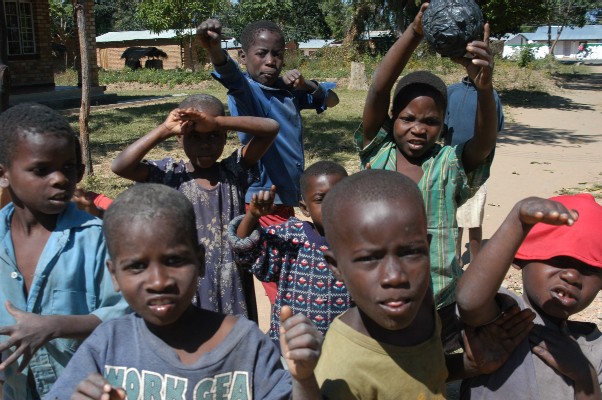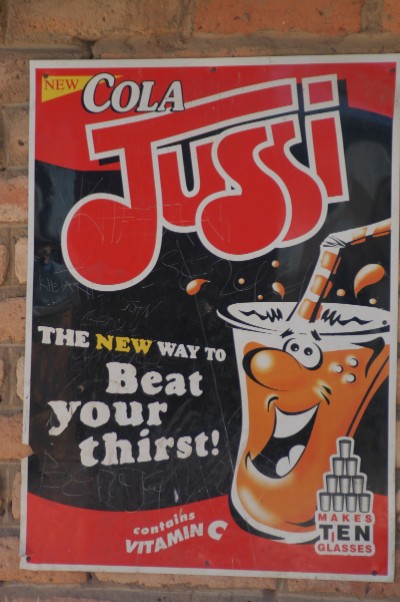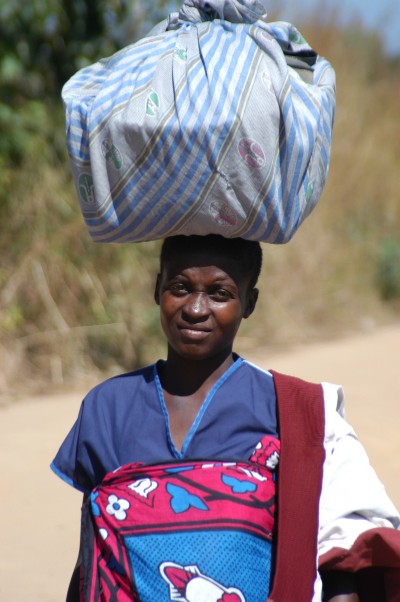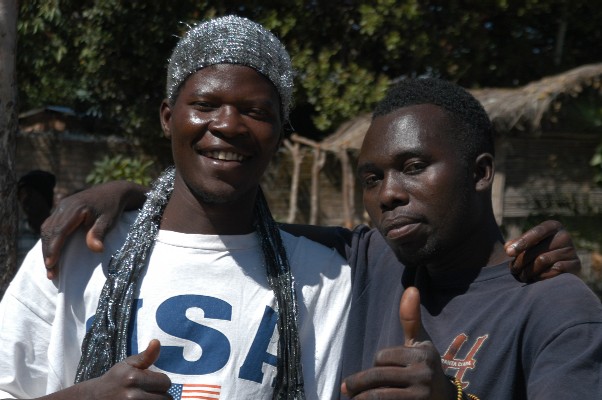July 6. KANDE BEACH "Village Walk" The one chance to glean a bit of local life in Malawi was the go on a village walk. Andres, Rob and I used the same guide that others had used the day before. His name was John Howard. Yes, we  had the privilege of being toured around by PM of Australia. John also ran a shop in the curio market outside the camp ground gate. The locals had learned, quite swiftly, that using a familiar name helped them get remembered. His cousin was named Mel Gibson. They really had a thing for the Aussies. had the privilege of being toured around by PM of Australia. John also ran a shop in the curio market outside the camp ground gate. The locals had learned, quite swiftly, that using a familiar name helped them get remembered. His cousin was named Mel Gibson. They really had a thing for the Aussies.
John started by taking us by a village water pump, where a group of women and children were gathered pumping water into various receptacles. We had already picked up a team of kids that were trailing behind us, one of them latched on either of my hands. They were darling but we could already predict where all of the attention was going. We weren't the first tourists to take a village tour.
As we passed people performing daily tasks John would explain what they were doing. We watched a woman preparing food and met the village laundry lady. When we lingered very long we offered to take a photo of the person. We had a small Polaroid that worked really well for that. It was common for people to ask for a copy of the photos we took of them and the Polaroid allowed us to satisfy the request immediately. Nobody asked for any money, which was refreshing, but we were guests in the village and wanted to reciprocate the hospitality. It was a difficult line to straddle between being too free handed with giving things which raised expectations of the people that came after us, perhaps even encourage begging, and showing appreciation to the community that was allowing you to visit.
John made a stop at his family house, showing us the layout and inviting us inside to sit down. It was a simple mud walled house with a thatched roof. It just had three rooms inside with a detached hut for cooking. He lived with his grandparents because his parents had died of malaria when he was young. In the living room there was a well worn couch and some chairs. A clock hung on the wall but it didn't work. Everything was neat and tidy, proudly showing what little they had. John told us about his goal to further his education. He was rather industrious with his curio shop and tour guiding. We were always skeptical about being worked for more money but I think John was quite genuine. He charged a reasonable sum for his tour and didn't ask for any more money. just had three rooms inside with a detached hut for cooking. He lived with his grandparents because his parents had died of malaria when he was young. In the living room there was a well worn couch and some chairs. A clock hung on the wall but it didn't work. Everything was neat and tidy, proudly showing what little they had. John told us about his goal to further his education. He was rather industrious with his curio shop and tour guiding. We were always skeptical about being worked for more money but I think John was quite genuine. He charged a reasonable sum for his tour and didn't ask for any more money.
Between the part of the village that stood near the camp and lakeside there was an open area of cassava (tapioca) fields. The kids started to follow us up the road so we asked John to tell them we would be back at the end of the tour. It was getting hard to listen to him with the children following. People waived from the fields as we passed by. We picked up a few more kids, older ones, along the dirt road. They cheekily posed for photos. One boy was running along with a wheel, keeping it in motion with a stick connected to the wheel with a string as he ran. Eventually we emerged onto the highway where a strip of shops lined both sides of the road. While our guide made no overt requests for money he did cleverly work places into the tour so we had the opportunity to patronize the local people, which was fair enough. A small market stocked a suspicious number of ballpoint pens, requests for which we heard whispered from some of the kids. It also had many bags of candy, especially in proportion of the quantity of other goods. Naturally we picked up another group of little kids as we emerged from the store but we hadn't bought pens and candy to hand out.
With a kid on either of our hands we just gave up and kept up with our guide with the kids in tow. We requested to be taken to the post office but it was closed for the weekend. The next scheduled stop on the tour was rather controversial. It was the maternity ward at the local hospital. Anke had mentioned feeling uncomfortable when they were taken there the day before. Inside the ward were two women with newborn babies and another pregnant woman with a small boy. We entered reluctantly and felt a bit embarrassed. Conscious of keeping our distance from the newborns we congratulated the mothers and gave them photos of their babies. The little boy burst out in tears at the sight of us so we gave him a balloon. We kept the visit short and inquired about the donations box on the wall of the maternity ward, feeling a bit guilty about our intrusion. We considered lending support to the hospital but John just told us to give money directly to the mot hers because the box didn't get checked often enough. We didn't intend to just hand out money to individuals so we left it at that. hers because the box didn't get checked often enough. We didn't intend to just hand out money to individuals so we left it at that.
The next stop was at the village school. This entailed a formal and rather preachy presentation from the school principal, a well rehearsed plea for money. We couldn't help but recall our school visit in Namibia and, in the end, decided not to give money. I think he was annoyed at us and that made him cut our visit to the classroom short. It was fine really because we felt like we were intruding on their educational time. Using mothers with babies and kids in their classrooms were good tactics to get money out of the tourists and it was always a difficult call to make, to give or not to give. Corruption could exist anywhere and there was never any way to know how the money was getting used or who it was supporting. It always seemed better to buy something from the community or find a reputable NGO that could give you confidence that the money would be used wisely. Even at the larger NGO level it was wise to be scrutinizing as they have their own set of problems and inefficiencies.
By the time we left the school we had a real pack of children following us. Knowing that we were nearing the end of our tour they started to be more direct in asking for pens, candy or our addresses. We had to politely tell them "no". They were such a cute bunch tough. It was really heartbreaking. We definitely have more than they do and giving something feels harmless enough. Heading back towards the lake we walked through the village's small market. A woman was selling her daily stock of fresh baked rolls. Rob finally gave in and bought up about 3/4 of her supply. When we reached the end of the market, where the cassava fields started again, he handed a roll to each of the kids. The money he spent went into the local economy and the kids each got something nourishing for their stomachs, not candy. The kids were thrilled and we felt better about the bread than just handing out money.
Before passing into the cassava field we visited the local church, a multi-denominational building used by all of the Christians in the village. It wasn't open but from the look of its simple exterior there probably wasn't very much inside. Heading down the dirt road we passed two women coming in the opposite direction. One had a huge bundle on her head that she gracefully carried along with casual ease. It always looked extraordinary to me. These people could carry almost anything on their heads. I couldn't even carry a book. its simple exterior there probably wasn't very much inside. Heading down the dirt road we passed two women coming in the opposite direction. One had a huge bundle on her head that she gracefully carried along with casual ease. It always looked extraordinary to me. These people could carry almost anything on their heads. I couldn't even carry a book.
Back at camp we still had the afternoon to spend enjoying the lake. We arrived just in time for lunch. In the afternoon, Rob, Andres, Anke and I took a break at the little cafe in the corner of the compound, where they served drinks and snacks. The tables had cartoons of the Far Side under the glass on the tables. The weather was rather gray and windy, not ideal for laying on the beach. A group of South African campers had arrived the day before, boldly pitching their tents right at the top of the beach, in front of everyone else. We all had a good laugh when they had to move in the middle of the night to avoid being blown over. When we walked to our bungalow to go to bed we saw one of the security men huddled in the back with his little stove. It was a really tough job and not a nice night for it. He looked uncertain when we passed so Rob told it was fine for him to stay there. It made us feel better to know he was there anyway. |

